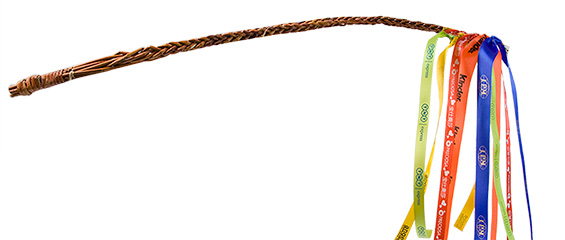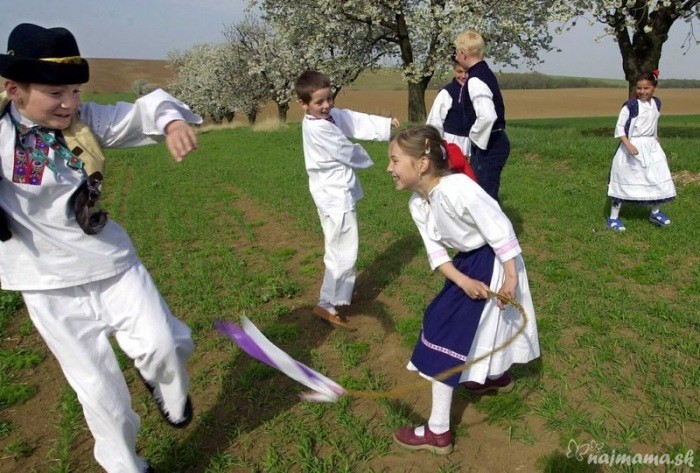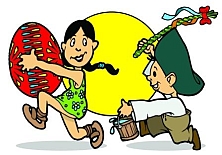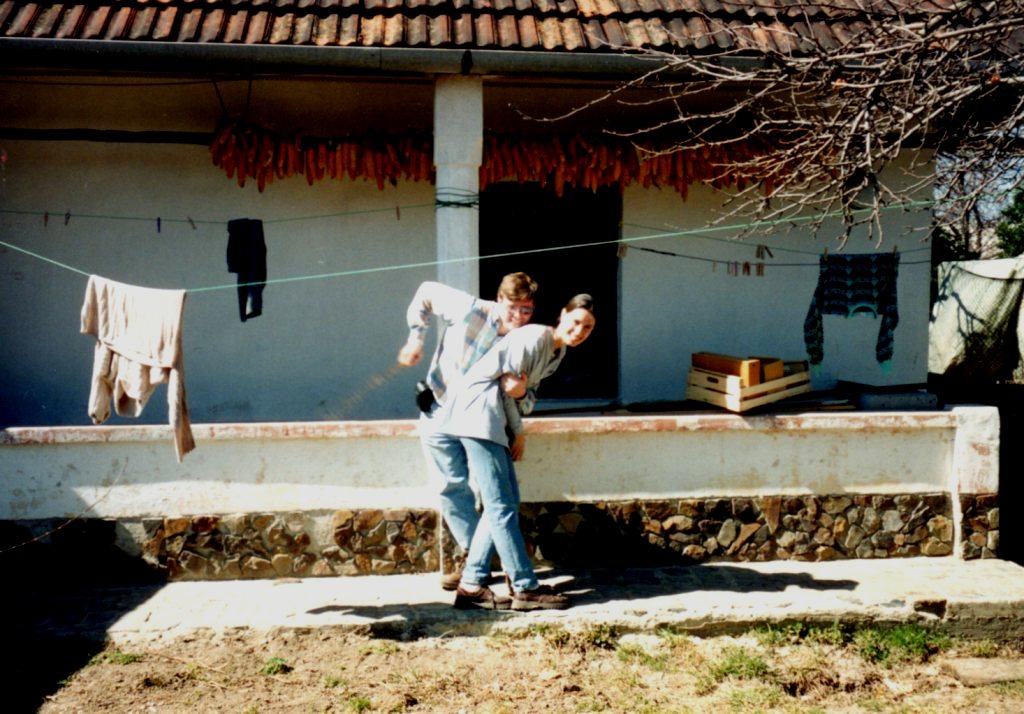“No.”
“Oh, there eez much exciting. The boys chase the girls weeth wheeps.”
“With whips?”
“Yes, weeth wheeps.” She gathered the last of her belongings. “Have nice weekend. Hope you see some action.”
She hurried out the office door, eager to get to her family’s cottage in a nearby village, leaving me with mental impressions of teenage guys cracking bullwhips. A mock threat, I hoped. They didn’t actually lash the girls, did they? I felt like Captain Kirk following Mr. Spock to his home planet to witness the Vulcan mating ritual. Slavic Europe sometimes seemed like another world.
The housemother at our school’s dorm had invited me to spend the weekend in her family’s cottage. There, I was relieved to discover that the “wheeps” turned out to be braided willow branches with bright red, green and yellow ribbons tied to the tapered ends.
“It means ‘little switch’,” said his girlfriend Anna.
“Yeah, and here’s how you use it.” Ľubo pulled one out of the vase on the coffee table and swung. Fwiiisshhhh. Anna nimbly moved her butt out of the way at the last instant.
“Not till Monday morning! Besides, Tuesday, the girls switch the boys.”
“That’s not true!”
“Well, you just better watch out.” She shook a finger at him.
Monday morning he did chase her down for a few playful thwacks as she giggled in response. Strange as it was, I suddenly wanted to take part in this ritual.
As the female residents returned from their holidays, I waited, arms folded behind my back, switch in hand, for a couple of my favorites. I chased them down the hall and whacked their bottoms while they laughed and squealed.
“Senk you! Ďakujeme!”
What? They even thank you for it? Indeed, they even apologized for not having any eggs to give me. Brightly painted eggs—Slavs excel in this art form. The exchange is part of the full ritual. But I missed out that year.
Over the years, I learned that switching is a specialty of Czechs and West Slovaks, but dousing with water is typical of East Slovakia (as in Poland, where girls also drench boys). The old pagan custom was probably associated with the spring equinox, but after Christianization, the debauchery had to wait until Lent was over.
Of course, water is an integral part of baptism, too, and certainly cleansing and renewal figure in spring celebrations the world over. And there’s no scarcity of pagan elements in Anglo-American eggs and rabbits—both fertility symbols. (Rabbits, curiously, are used by Germanic peoples but not Slavs.)
As I continued living in Slovakia, I eventually did earn my share of colored eggs. I’d ring on the apartment door of a young female and “greet” her with my switch. I’d have a spray bottle full of water at the ready—I wasn’t going to dump a bucket indoors.
She’d give me an egg and invite me in, where her mother had prepared a table loaded with ham, potato salad, sausage and desserts. Her father would pour shots of plum brandy for a toast. Parents took pride in the attention their daughters attracted.
I often visited young women I had a flirtatious relationship with—one even became my girlfriend soon afterwards. But I always did this routine on my own—and I missed the male camaraderie of going from door to door in groups. I envied dance ensembles who wore colorful folk costumes and spanked, doused and squealed to lively accordion music.
We continued to make the rounds, collecting painted-egg and chocolate-egg booty until mid-afternoon, when our designated driver took us to a farm outside of town. As we’d already scouted out, our soprano soloist Emma was there with her grandparents.
After a knock at the weathered oak door, our last victim, a lithe dark-haired beauty of eighteen, emerged. Two fellows grabbed Emma by the arms and led her out, over her playful protests, into the barnyard. Hens clucked and scampered out of the way; a dog in its pen barked at the commotion. A third guy pulled the bucket from the century-old stone well while I readied my camera. I snapped two shots quickly: ker-SPLASH! She wriggled free and only got wet on one side, but the rite of spring was complete.
Emma changed into a sweatshirt and hung her wool sweater on the line to dry, and we convened in the rustic, one-story farmhouse with its whitewashed concrete walls and brick stove in the corner. Must have belonged to her great-great-grandparents back in the days of Austria-Hungary.
Grandma passed around a tray of cabbage rolls while Grandpa poured a round of vodka.
“Do you have customs like this in America?” He grinned with delight and curiosity.
“No, I’m afraid we don’t.”
“See what fun it is?”
“Oh, yes. Out here in the country, with all this hospitality—it’s the best I’ve experienced yet.”
The elderly couple smiled in satisfaction.
I added, “I’ll miss it when I’m back in the States next year—but I’ll be sure to tell all about it.”
That was eighteen years ago. I still get a kick out of telling about it today.




 RSS Feed
RSS Feed